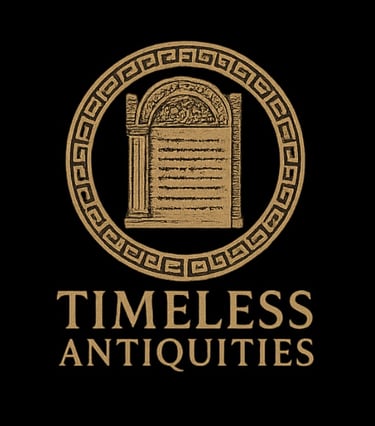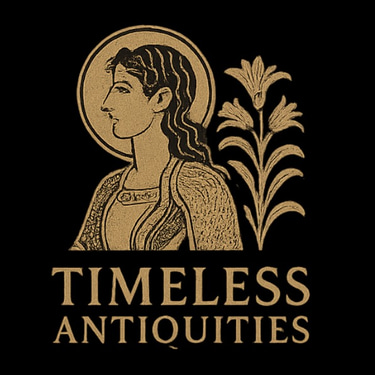
Risk Management & Insurance for Collectors
Owning rare antiquities, manuscripts, and collectibles is both a privilege and a responsibility. These historical assets are vulnerable to theft, natural disasters, handling damage, and market fluctuations. Effective risk management and insurance are essential to protect your collection’s financial and historical value.
Key Risk Management Tips:
Inventory & Documentation
Maintain a detailed inventory of your collection, including photographs, provenance, purchase records, and certificates of authenticity.Secure Storage
Use climate-controlled environments with low humidity and stable temperatures. Fireproof safes, security systems, and UV-filtered display cases can minimize risk.Regular Appraisals
Ensure appraisals are updated every 3–5 years (or more frequently for rapidly appreciating items) to reflect current market values.Legal Protection
Use ownership agreements or trusts to protect your collection for future generations or charitable donation purposes.
Insurance Options for Collectors


Specialty Collectibles Insurance
Unlike standard homeowner's policies, collectible insurance offers "agreed value" or "scheduled" coverage without depreciation.Blanket vs. Scheduled Coverage
Blanket coverage protects the entire collection with one overall limit.
Scheduled coverage lists each item individually, ideal for high-value or unique items.
Top Providers
Look for insurers that specialize in fine art and antiquities (e.g., Chubb, AXA Art, Huntington T. Block, or Lloyd’s of London brokers).
Appraisal Services & Education


Qualified Appraisers
Choose appraisers accredited by recognized organizations like:The Appraisers Association of America (AAA)
International Society of Appraisers (ISA)
American Society of Appraisers (ASA)
When to Appraise
Insurance purposes
Estate planning
Tax reporting for charitable donations
Pre-sale valuations
Appraisal Types
Fair Market Value (for IRS/tax use or estate donations)
Replacement Cost (for insurance)
Liquidation Value (for urgent sales)
Taxes, Donations & Estate Considerations


IRS & Tax Guidelines for Collectors
Charitable Donations
Donating a valuable item to a museum or educational institution? You may be eligible for a tax deduction at fair market value, if held over one year and appraised by a qualified professional.Capital Gains Tax
When selling a collectible held for over one year, long-term capital gains tax applies—often at a maximum rate of 28% for collectibles.Estate Tax Planning
High-value collections may increase estate tax liabilities. Consider gifting strategies, irrevocable trusts, or qualified appraisals as part of legacy planning.IRS Form 8283
Required for non-cash donations over $5,000. An appraisal and Section B of the form must be completed and submitted.


Manuscripts
Definition:
Handwritten texts produced before the printing press revolutionized reproduction. Often copied by monks, scribes, or scholars on vellum or parchment.
What Makes Them Valuable:
Age and condition
Unique marginalia or illuminations
Association with significant authors, scribes, or institutions
Examples in Our Collection:
14th-century Latin religious text
Illuminated pages from medieval Psalters


Incunabula
Definition:
Books printed before 1501, during the infancy of the printing press. The term means “swaddling clothes” in Latin, referring to the birth of printed knowledge.
Why It Matters:
Bridged the manuscript and print worlds
Often feature woodcut illustrations and Gothic or Blackletter typefaces
Limited surviving copies due to fragility and time
Examples:
Printed theological texts from Venice, ca. 1490s
Early printed New Testament excerpts
Papyrus Fragments
Definition:
Ancient scroll material made from the papyrus plant, used extensively in Egypt, Greece, and early Christian communities.
Characteristics:
Fragile and fibrous
Written in Greek, Coptic, Hebrew, or Latin
Often biblical, legal, or poetic texts
In Our Collection:
Early Christian Coptic script on papyrus
Legal document fragment from Roman Egypt
Sacred and Classical Art
Definition:
Includes religious paintings, iconography, mural fragments, and symbolic artwork from pre-modern civilizations.
Why It Matters:
Reflects theological belief systems and cultural aesthetics
Often painted on wood, gold-leaf icons, or fresco sections
Rare due to persecution, war, and time
Highlights:
Medieval Christ icon (tempera on wood)
Minoan fresco fragment from Knossos (Crete)
Antiquarian Bibles & Early Scripture
Definition:
Early printed or handwritten editions of the Bible or scriptural texts in Latin, Greek, Hebrew, or vernacular.
Educational Value:
Track development of translations (e.g. Vulgate, Geneva, King James)
Important for theology, linguistics, and printing history
In Our Collection:
Early Geneva Bible pages
16th-century Protestant reform movement Bibles
Hebrew scripture leaves with commentary






Antiquities Glossary


🔗 Join our newsletter to receive historical spotlights on rare works and preservation techniques.
📩 Contact us to request scholarly research or collection partnerships.
Want to Learn More?
Timeless Antiquities Is Here to Help
We’re committed to helping collectors protect their treasures—financially, physically, and historically. Reach out for guidance or connect with trusted partners in insurance, appraisal, and legal planning.
© 2025. All rights reserved.
Preserving the past to enlighten the present.






